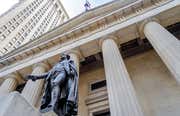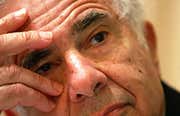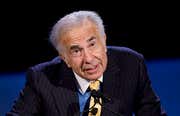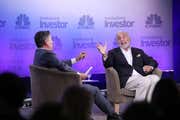
|
Carl Icahn joined Dreyfus & Co. as a broker during a strong bull market, which was followed by the “Kennedy Slide,” which began in December 1961. Through June of 1962, the S&P 500 dropped by 22.5%, with some major market indexes falling by roughly 40% on a single day in May.
With those experiences under his belt, Icahn changed jobs and companies, joining Tessel, Patrick & Co. as an options manager in 1963. The next year he took over the options department at Gruntal & Co.
Before long, Icahn was making enough money for his employer that he felt ready to open his own shop. He turned to his uncle, Elliot Schnall, a recently divorced owner of a successful loose-leaf-binder business. Icahn had made Schnall a lot of money over the years with investment tips, and so Schnall agreed to loan him the $400,000 to buy a seat on the New York Stock Exchange (NYSE).
The newly formed Icahn & Co. focused on options strategies and arbitrage, especially takeover arbitrage. That’s when he began to make what seemed to him like big money at the time, “$1.5 to $2 million a year,” he recalled. Being privately held, there’s no public record of how well Icahn & Co. did over the next decade. But news reports from the early 1980s put the company’s net worth north of $100 million.
By 1978, Icahn was ready to do more than just invest in takeover opportunities. He was ready to create his own. He took a large position in Tappan Co., an Ohio-based company that made stoves and other appliances. When Dick Tappan, the head of the company, found out, he called Icahn. During the call, Icahn demanded a seat on the board. Fearing that Icahn would take over the company and sell off its less-profitable parts, Tappan sought another buyer.
By the time that buyer, Swedish appliance maker AB Electrolux, had finished the acquisition, Icahn’s shares had more than doubled, and he had made roughly $2.7 million on the investment. What’s more, Icahn had won a new investor in his future takeover plans: Dick Tappan. (See also, Could Your Company Be A Target For Activist Investors?)
With more backing and more of his own capital, Icahn took over Bayswater Realty & Capital Corporation and ACF Industries in 1979 and 1983, respectively.
In those years, many companies came to know Icahn’s bullying approach to top executives and corporate boards. It was a key to his success.
"Very few people had the tenacity I had," Icahn later said in an interview. "I'm a very competitive guy. Passionate or obsessive, whatever you want to call it."
In 1985, he was ready to go after some of the biggest names in American business. Following on the heels of an unsuccessful takeover bid by T. Boone Pickens, Icahn made an $8 billion leveraged buyout offer for Phillips Petroleum. His bid was backed by junk bonds underwritten by 1980s debt powerhouse Drexel Burnham Lambert. (For more, see: Understanding Leveraged Buyouts.)
Phillips fought back, its board approving a poison pill, which wrote into the company bylaws a stipulation that, in the event of a hostile takeover, the company would pay shareholders in preferred shares whose terms would make the acquisition untenable to whoever was crazy enough to try it. In the end, Icahn agreed to sell his shares back to the company and made a reported $50 million by walking away.
Later that year, Icahn took on what was to be the biggest challenge of his career, obtaining a major position in Trans-World Airlines (TWA). It had recently been named the third-least-admired major American corporation in America by Forbes and was beset by nine-digit annual losses, and Icahn sensed that TWA could be had at a steep discount.
TWA’s board and executive leadership fought back. Following the example set by Phillips, it took out a full-page ad in national newspapers to let Icahn and its shareholders know it wouldn’t go quietly. The airline’s legal team even went to court to stop Icahn from buying more shares.
But TWA was more than $1 billion in debt and didn’t have too many tricks up its sleeve. To avoid being purchased by Icahn, it searched for another airline to buy it. But its unions vetoed the only interested buyer, Texas Air. So after much negotiating between Icahn, the TWA Board, Texas Air and the pilots’ union, Icahn took control of TWA for roughly $800 million in total commitments.
He had won the battle. But the difficulties were just beginning. Now he was the CEO, and after the contentious takeover, all eyes were on Icahn and his foundering airline.
“I was looking for a challenge, I got it,” he later said about TWA.
Over the next few years, the airline struggled financially, and its employees, some of whom had agreed to pay cuts to avoid having their company bought by Texas Air, went on strike for better pay. (See also, Most Successful Unions.)
In 1988, Icahn took TWA private. But it continued to falter, selling half of its valuable London routes to American Airlines for $445 million in 1991 before declaring bankruptcy the next year. When TWA emerged from bankruptcy, Icahn resigned as chairman, though he still owned 55% of the airline, which owed him $190 million.
In the meantime, he continued to buy up stakes and threaten proxy fights with corporate giants such as Texaco and Nabisco, not acquiring either, but making out handsomely for his troubles.
In 2004 Icahn brought on new investors to finance his takeover and greenmail strategies, raising $3 billion to start a hedge fund, called Icahn Partners. In addition to his own investments, he earned 2.5% assets invested with him, plus 25% of profits. By 2007, the fund had grown to $5 billion. Using the funds and his own capital, he made runs at Blockbuster Video, Mylan Laboratories and Time Warner (TWC).
But even Icahn wasn’t immune to the 2008 financial crisis, which slammed his funds. They saw losses of more than 35%, and many of his investors ran for the exits. In 2010, Icahn sold the majority of his shares in Blockbuster at a $180 million loss. And in 2011, he returned the investments of his hedge fund investors.
Acting without investors, he continued his investments and his vocal, public shareholder activism, taking big positions in Clorox (CLX) Netflix, Apple, eBay and Family Dollar between 2011 and 2014. During that time, he demanded, and later took credit for Ebay’s 2014 decision to spin off PayPal (PYPL), as well as Apple’s 2015 decision to increase its stock buyback program.
Carl Icahn: Net Worth
-
 Financial Advisor
Financial AdvisorThis Is What Carl Icahn's Portfolio Looks Like (IEP)
Read about some of the holdings in Carl Icahn's portfolio. Learn about his activist campaigns against companies that he believes are performing poorly. -
 Investing
InvestingWhere Does Carl Icahn Keep His Money?
Learn about where Carl Icahn keeps his money. Read about how a number of his investments in energy companies lost significant value in 2015. -
 Investing
InvestingIf Carl Icahn Lost 20% in 2016, What Hope is There?
If iconic billionaire Icahn loses that much, are hedge funds pointless? -
 Investing
InvestingRecent events may impact Icahn's portfolio (AAPL, AIG)
Recent Events Surrounding Apple Inc. (AAPL) and American International Group Inc (AIG) May Impact Carl Icahn's Hedge Fund -
 Retirement
RetirementBillionaire Carl Icahn's Q1 Moves: PYPL, AAPL
Billionaire hedge fund manager Carl Icahn reduced his holdings in PYPL and AAPL in Q1. Let's find out why. -
 Investing
InvestingIcahn Will Assume Ownership of Federal-Mogul
The back-and-forth between billionaire Icahn and the auto parts maker will result in his assuming full ownership. -
 Investing
InvestingCarl Icahn Nearly Exits Allergan Position in Q3 (AGN, HLF)
Icahn makes a big reversal on the embattled pharmaceuticals company, according to his Q3 13F. -
 Investing
InvestingDoes Carl Icahn Want to Buy Out Herbalife?
Icahn has been in a contentious battle with investor Bill Ackman about Herbalife and has continued to up his stake--and suggesting it go private.


